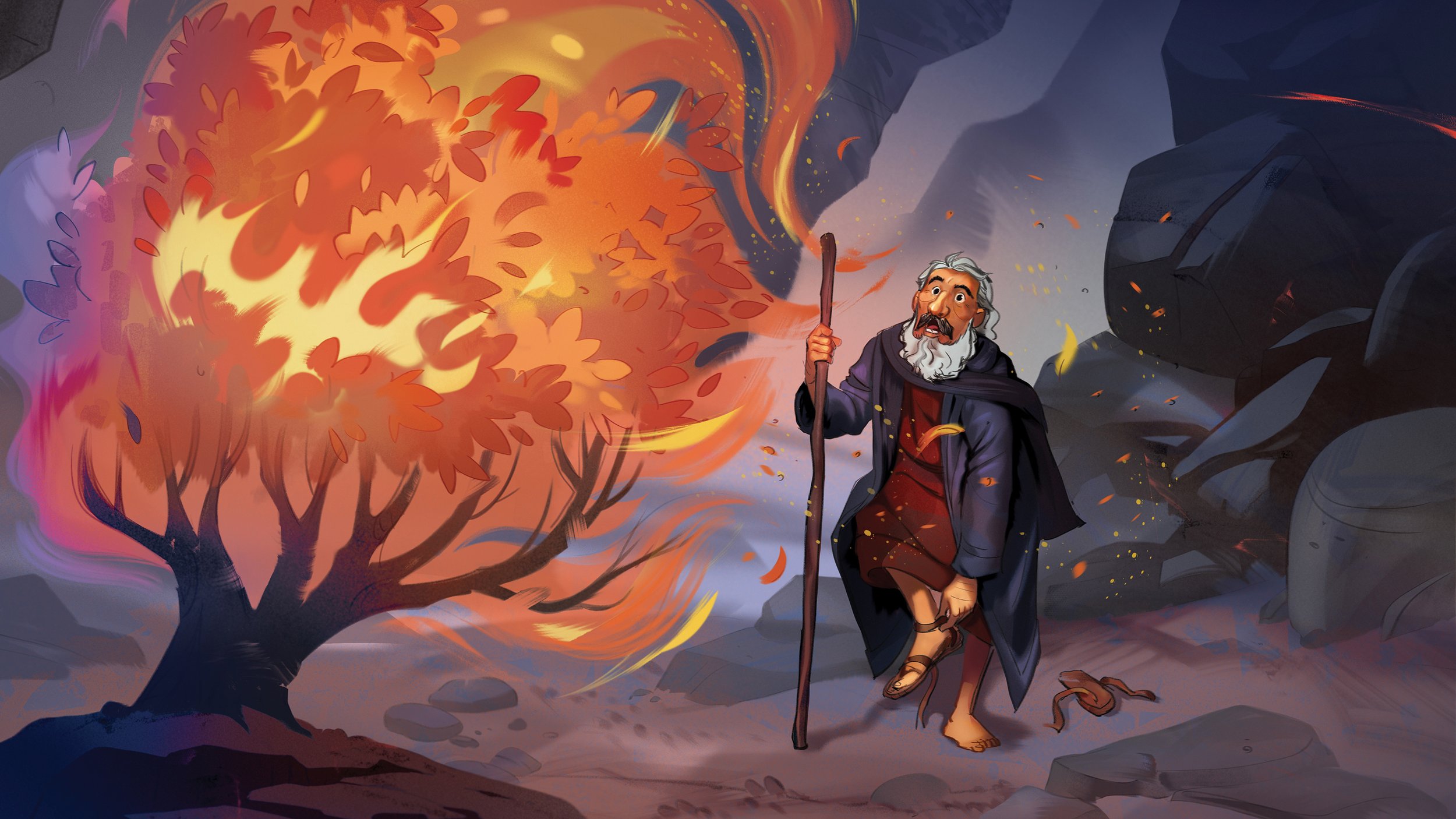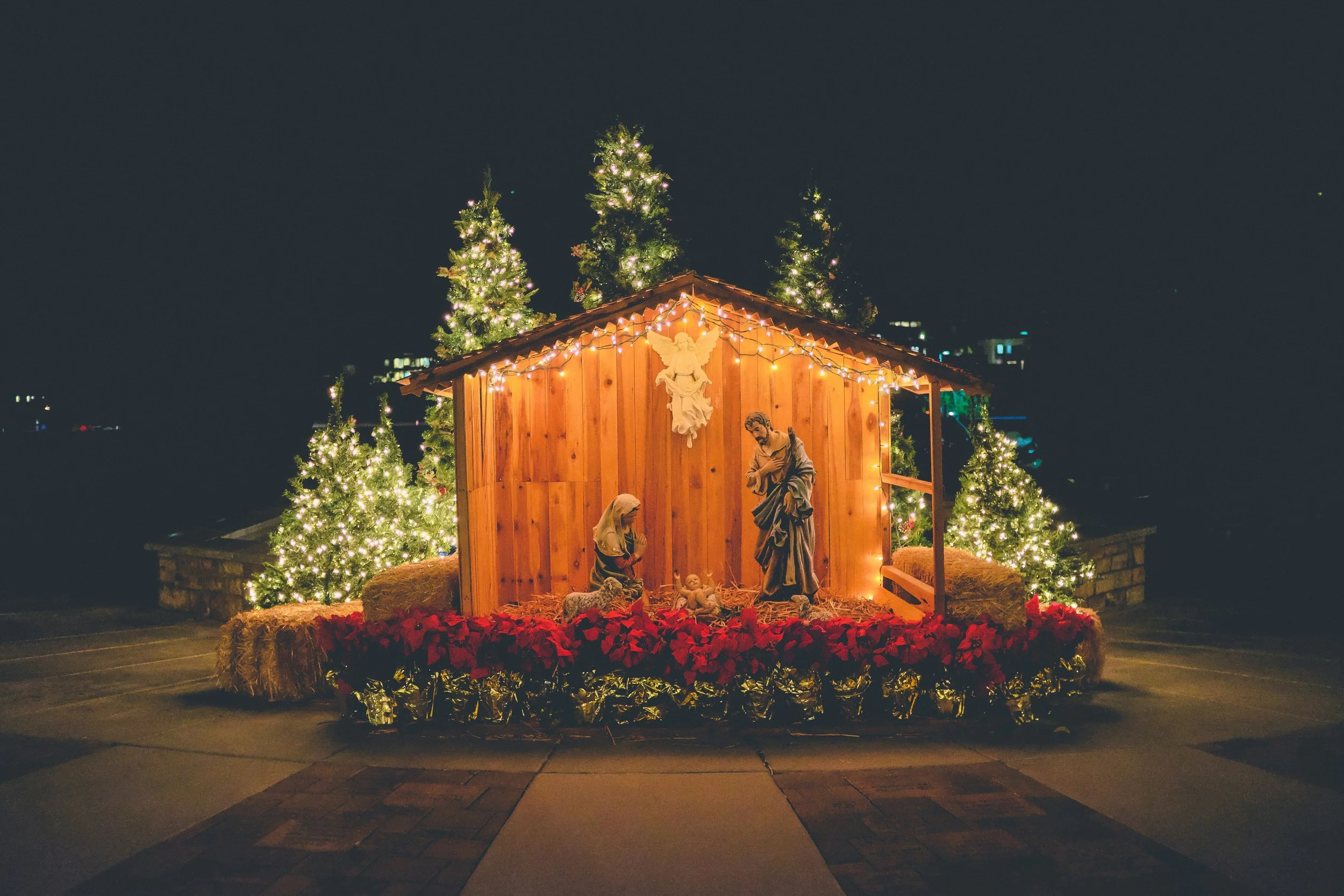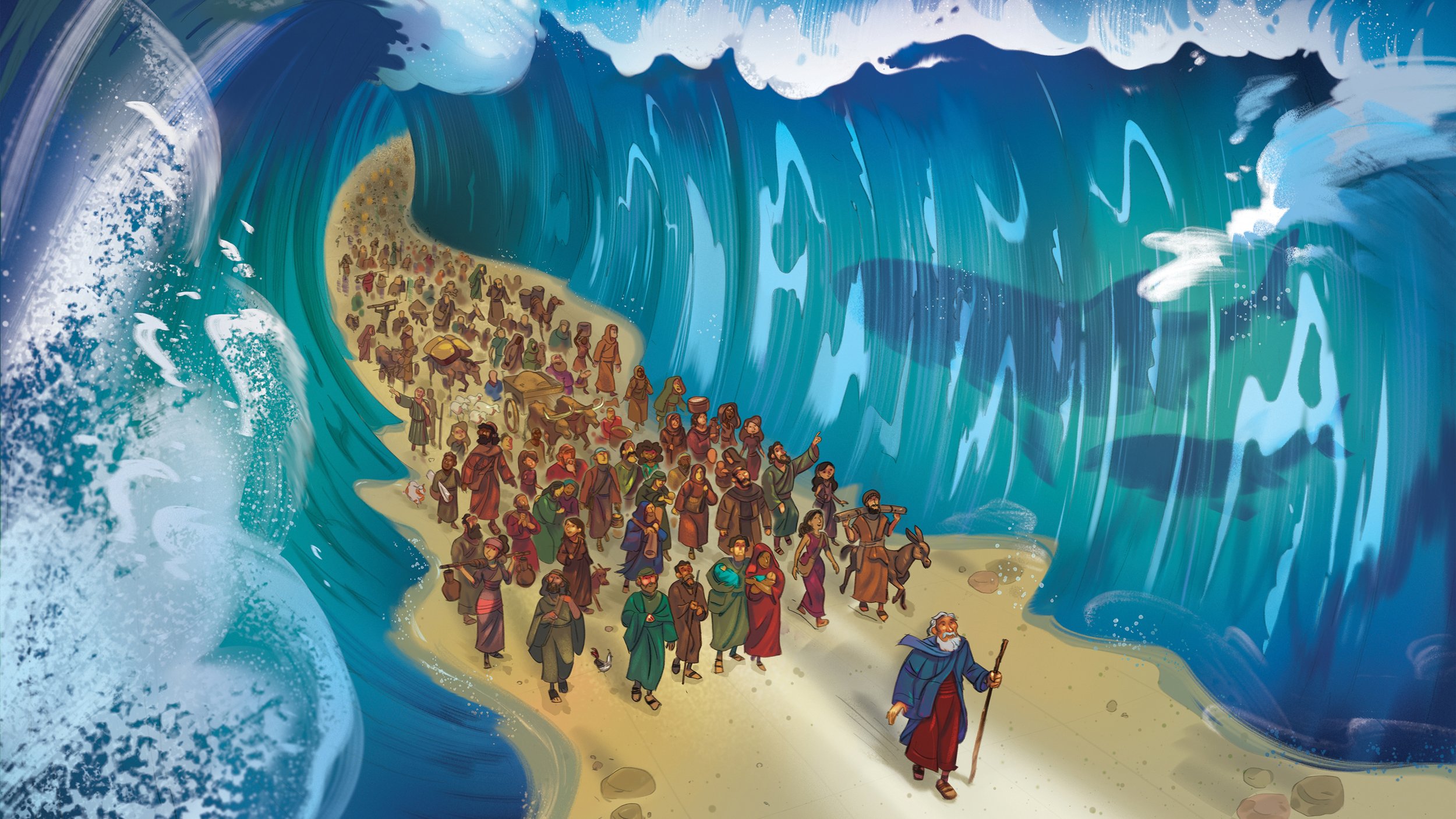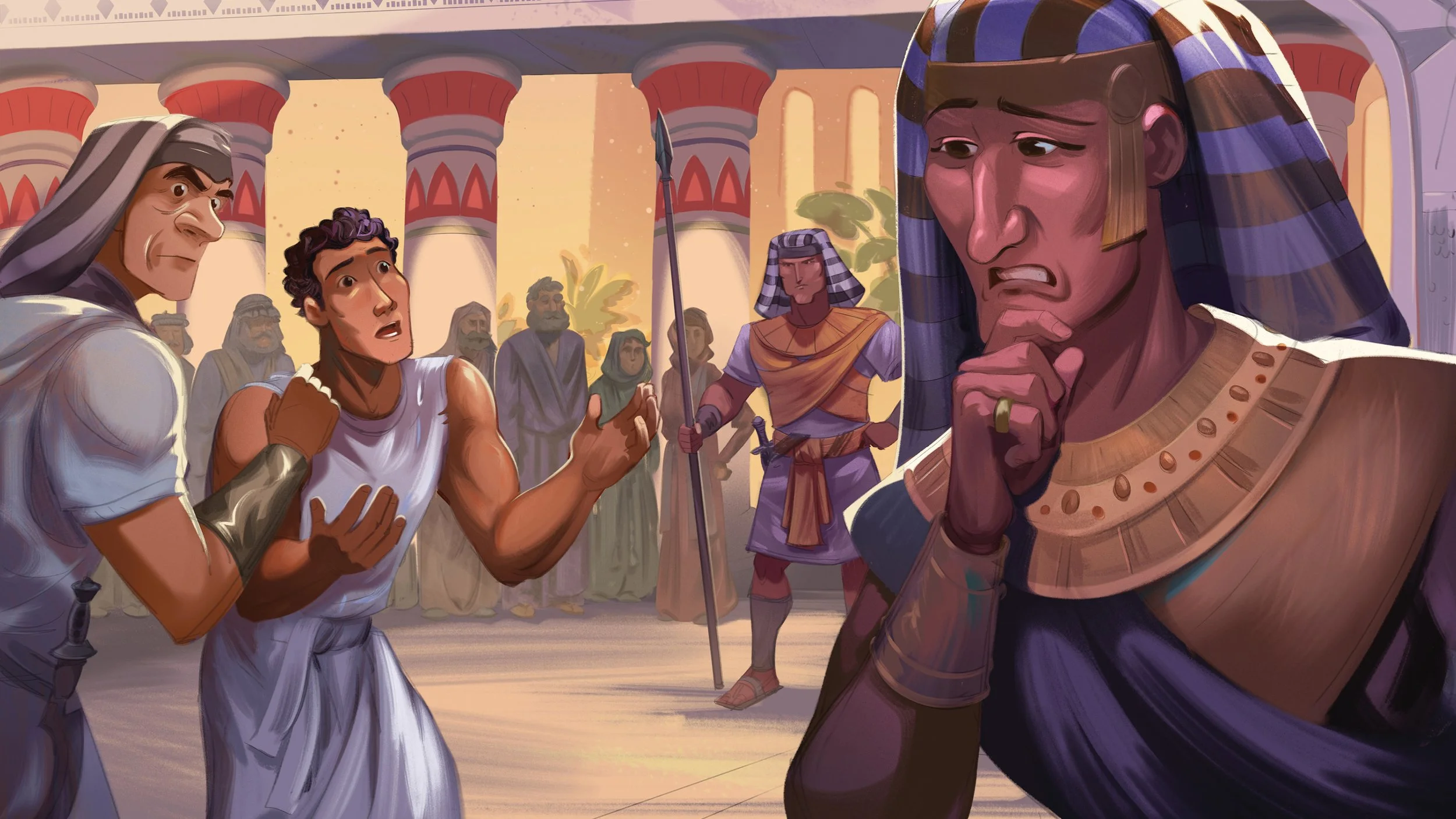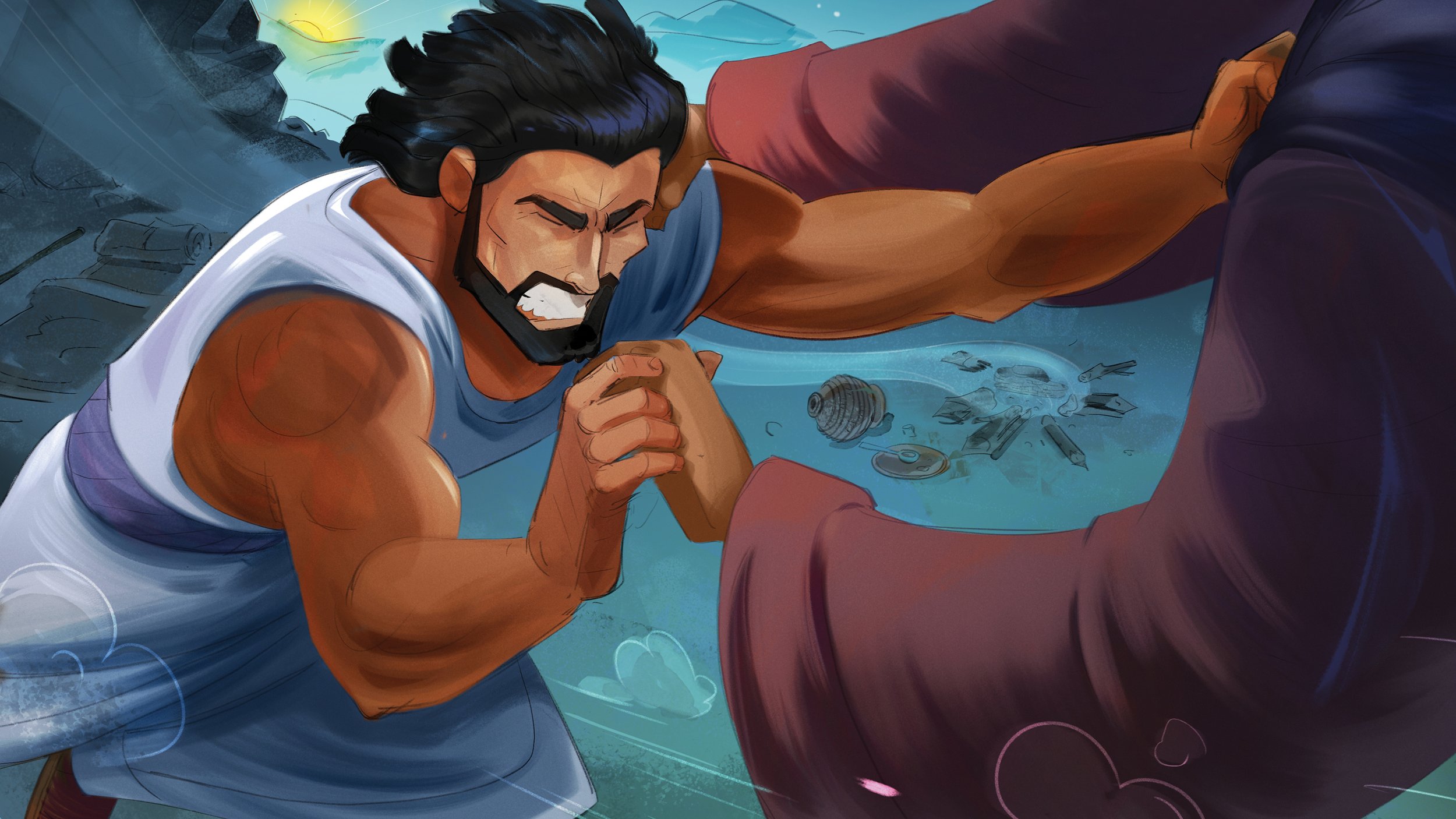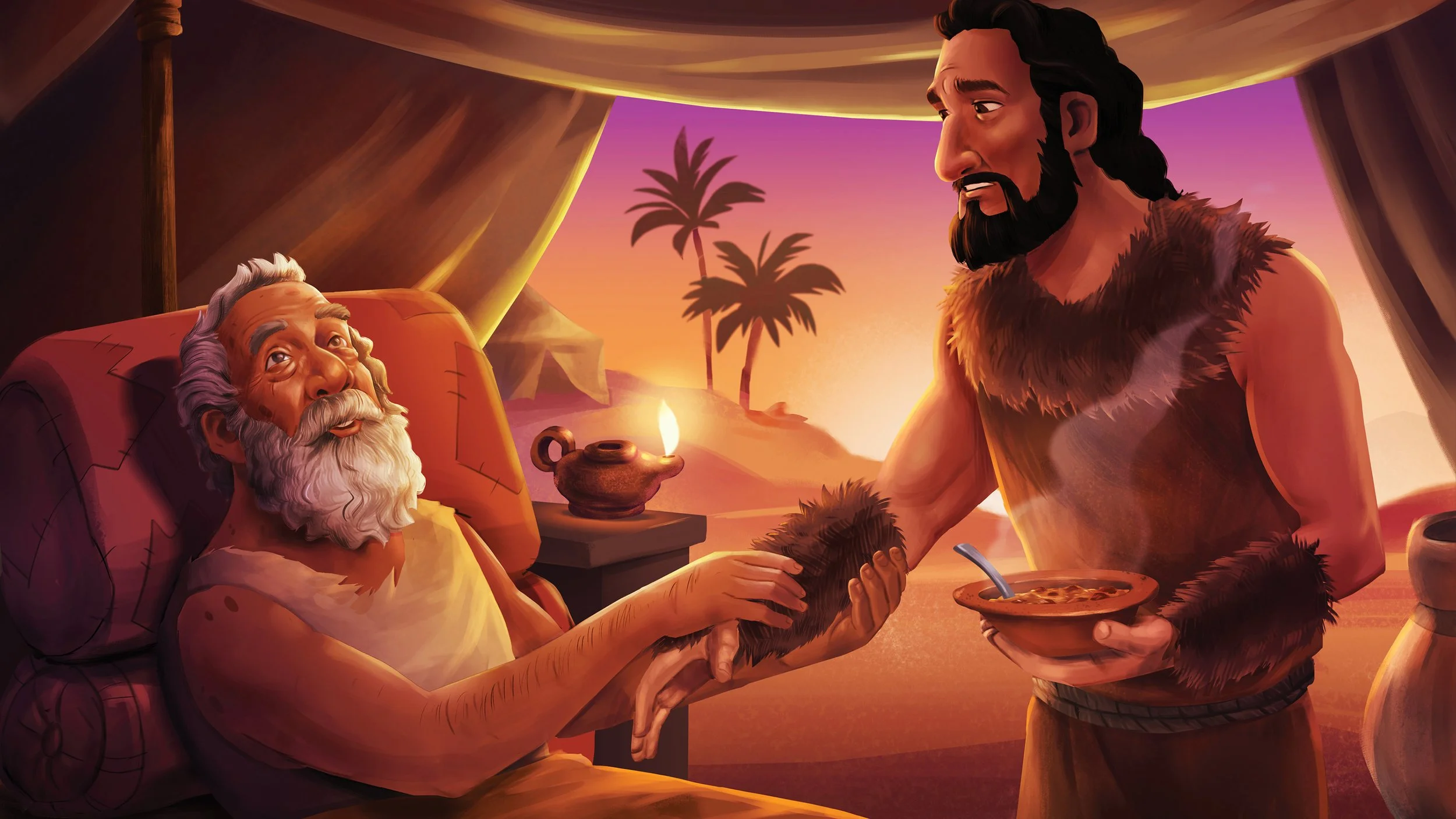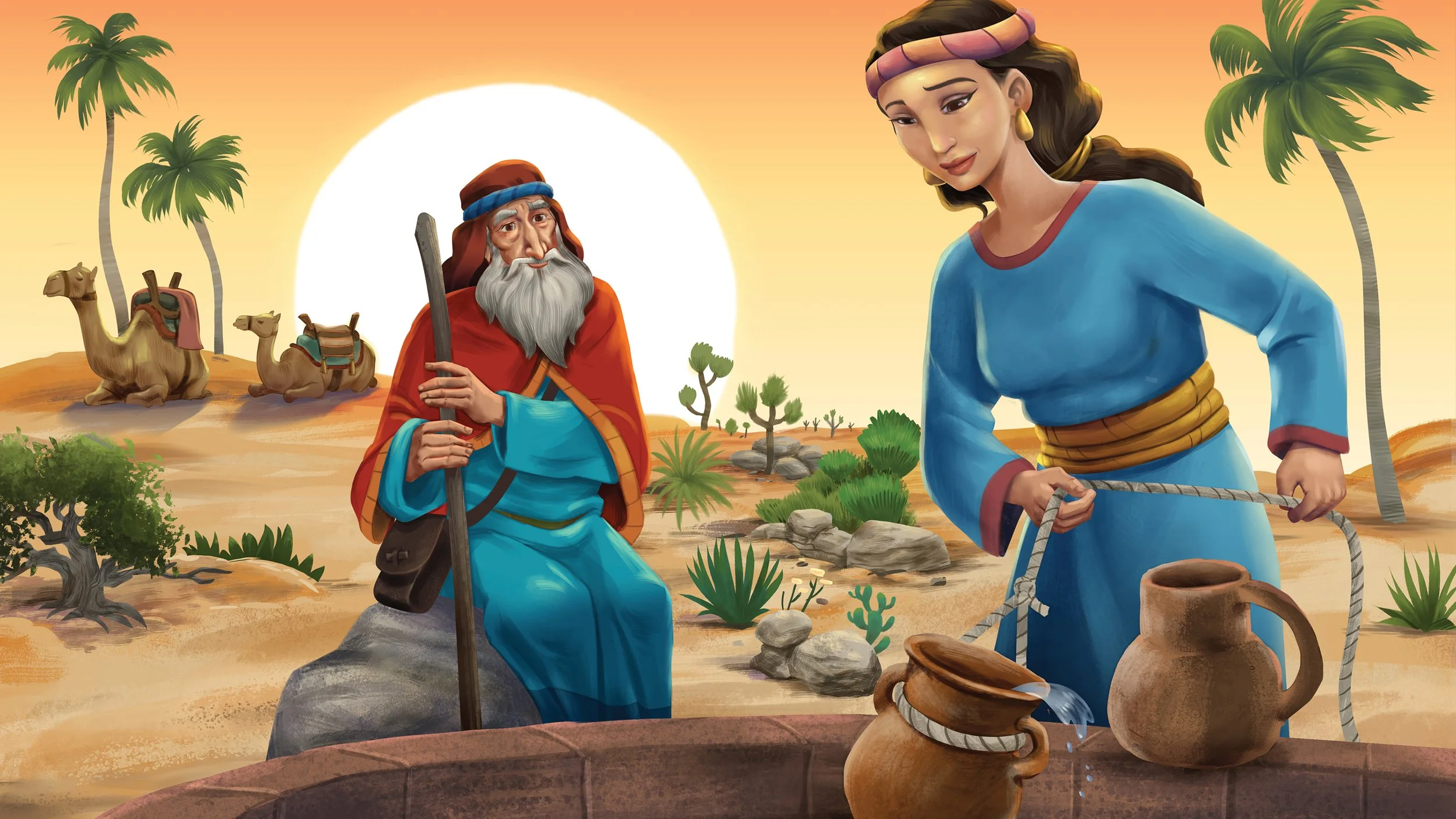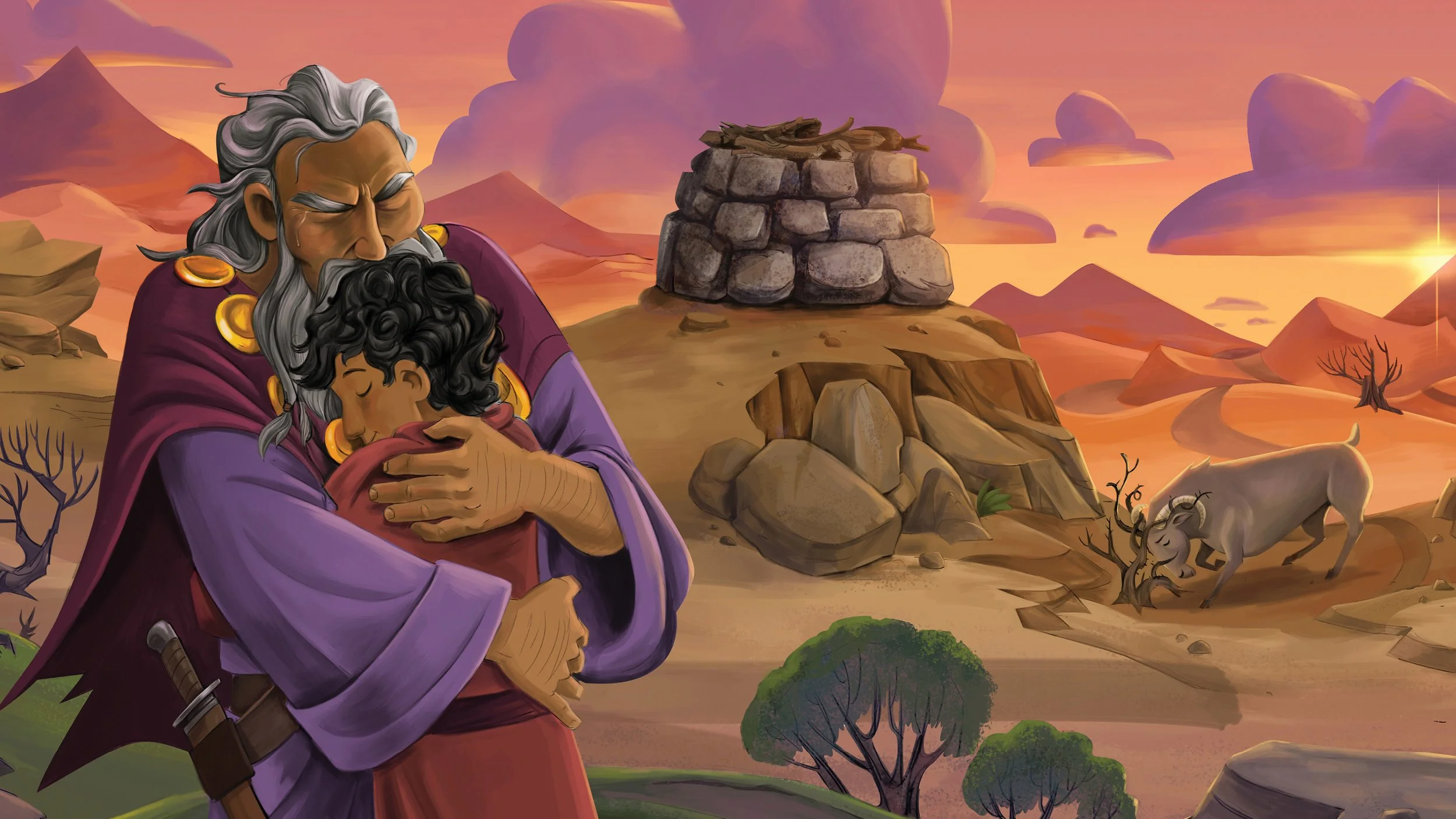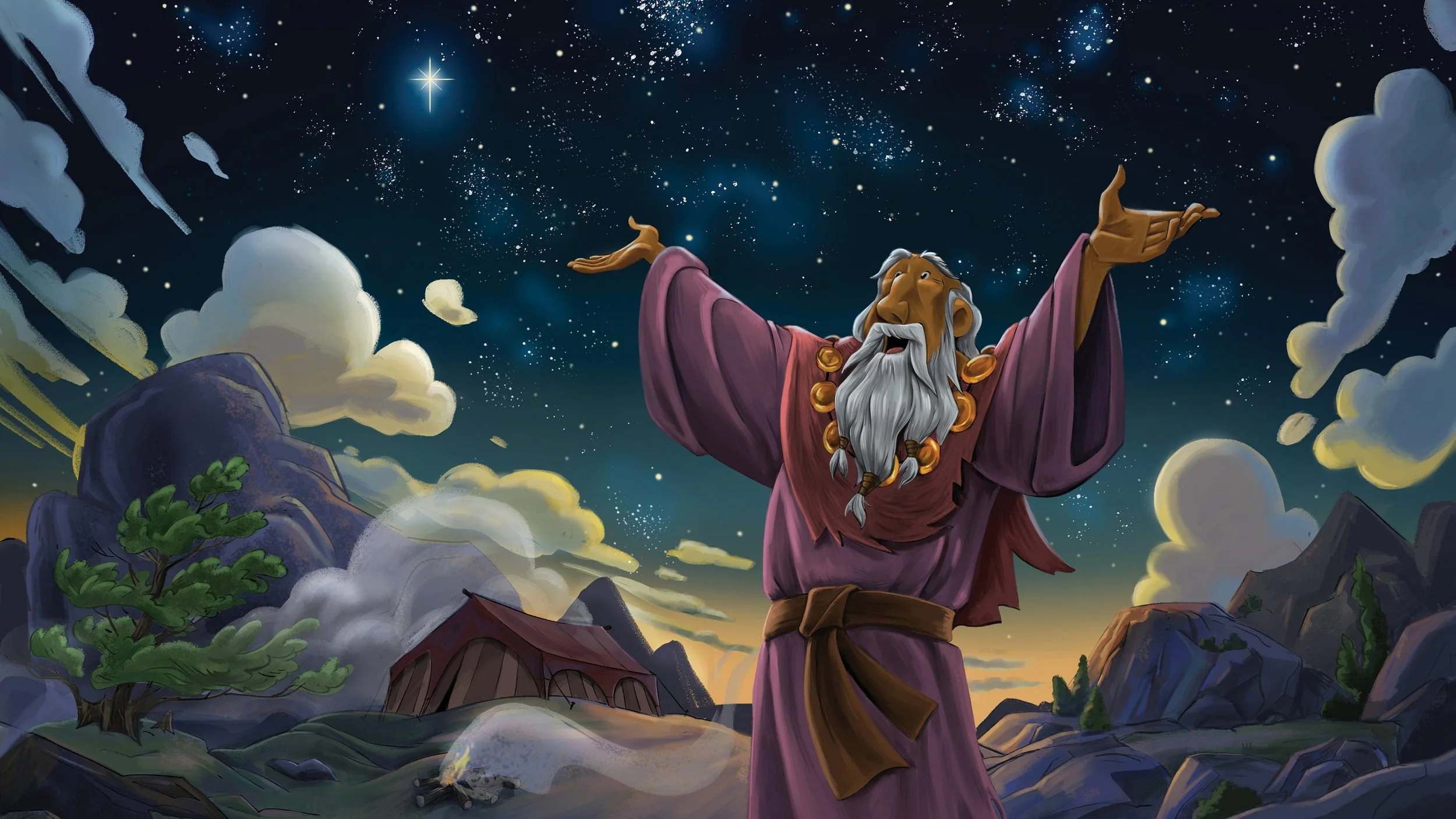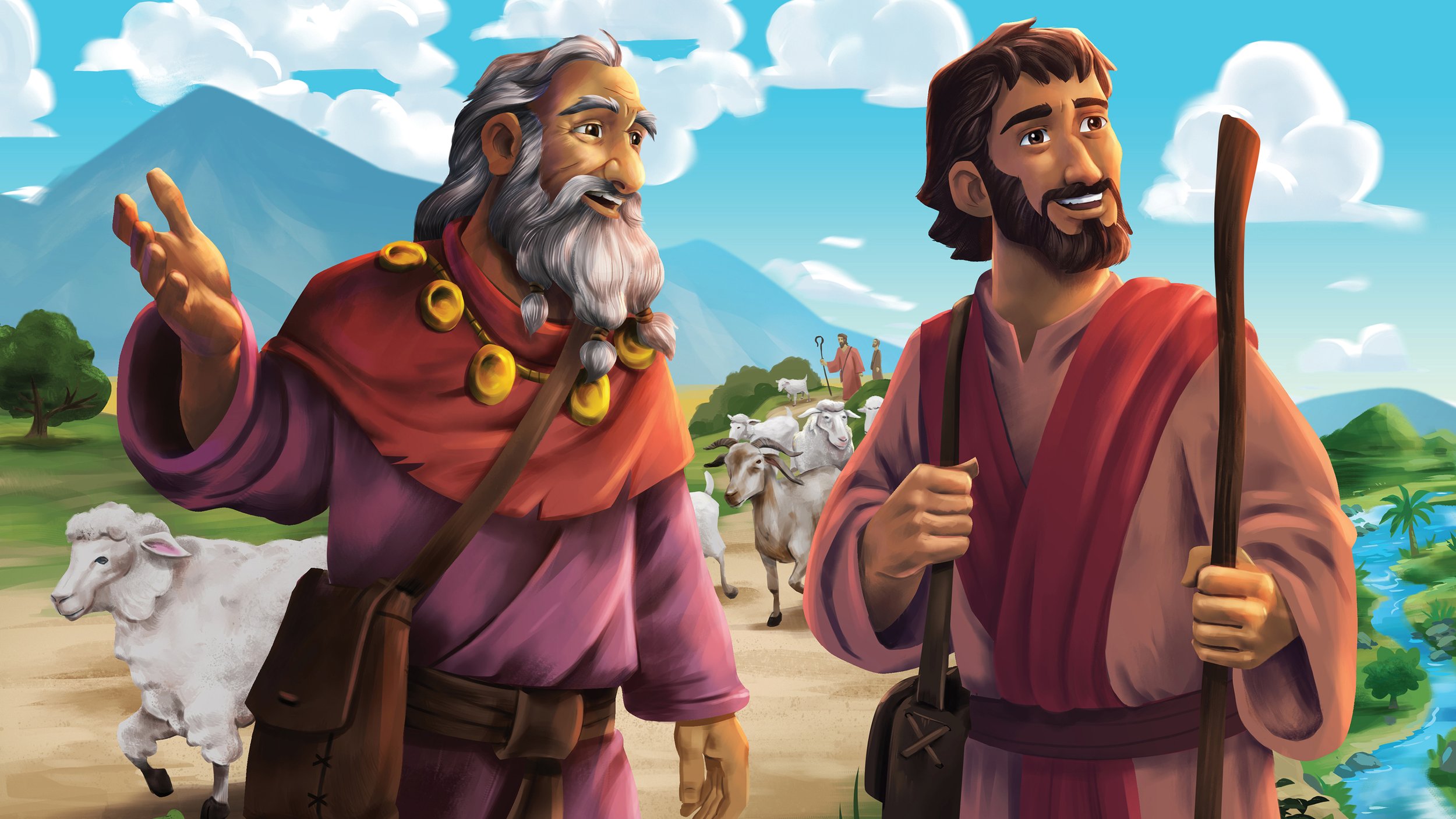MORNINGSIDE KIDS
Building the Tabernacle (Exodus 35-40)
This week's Bible passage highlights the wonder that a holy God would desire to dwell among His people. In the previous chapter, God instructed the Israelites to obediently abide within His covenantal love. Now, it was time to build the place where God would dwell with His people as they journeyed toward the Promised Land.
What was the significance of the people’s tabernacle offerings? Why don’t Christians meet with the Lord in a tabernacle today?
God’s instructions were for each of the tabernacle’s components to be freely given by all who were willing. He called for artisans to use their skills to construct, create, and design the tabernacle and all its furnishings. Scripture details that everyone whose heart was moved and whose spirit was prompted brought an offering to the Lord for the tent of meeting and its services, as well as for the priest’s holy garments. The people offered up their finest jewelry, textiles, spices, and oils—all of which were initially provided by God Himself when the people fled Egypt. Skilled designers were even gifted the ability to teach others their craft. Together, these craftsmen lent their time and skills to the work of the tabernacle. Eventually, people brought much more than was needed, so Moses ordered them to stop! They had more than enough materials to construct a tent according to God’s commands and worthy of His presence.
Today, though we gather at local churches to worship God and commune with fellow believers, it is not in physical structures where God dwells among His people. Instead, those who are in Christ receive the gift of the Holy Spirit who dwells within us. Jesus tells us in John 16:7 that the gift of the Holy Spirit is greater than His physical presence was as He walked among His disciples! Pray for the Lord to prompt the kids in your family to heed His call of salvation, that He would dwell within them as their Lord. May we read of the tabernacle’s splendor and respond, not out of obligation, but in awe of the closeness and kindness of our Lord.
Christ Connection: God told Moses and the people to build the tabernacle so that He could dwell among them. We no longer need a tabernacle because those who trust in Jesus’ life, death, and resurrection have been given the Holy Spirit so that God lives in us, not merely near us.
The Golden Calf (Exodus 32; 34)
Exodus 32’s account of the golden calf showcases the sinful idolatry of people in contrast with the merciful nature of God. In the 40 days it took Moses to return from Mount Sinai, the people had grown impatient. They urged Aaron to join in their mission to find a new object they deemed worthy of worship and devotion: a golden calf.
What led God’s people to fall prey to this idolatry? How does Moses’ leadership foreshadow Christ’s intercession for God’s people?
An idol is anything we worship in the place of God. Unfortunately, the Israelites wrongly believed they needed a new god to go before them since Moses’ absence left them doubting if he would return and worried about who would lead them. How ironic it was that they sought to dethrone God while claiming to throw a festival in His honor (Exodus 32:5). Their impatient uncertainty led them to replace God’s sovereign plans and rightful worship with this golden god of their own creation.
As God’s anger grew against the Israelites’ sin, Moses reminded the Lord of all He had done for His people since Egypt and urged Him to relent from His planned destruction. In remembering His covenant with Abraham from long ago, and upon Moses’ urging, God did not completely destroy His people. God was faithful to uphold His covenant promises despite the unfaithfulness of His people. He instructed Moses to create two new stone tablets on which God Himself would engrave the Ten Commandments. Moses pleaded for the Lord to journey with His people, forgive them, and set them apart as His own nation and possession.
Moses was a sinful man, so his intercession for God’s people was not enough to bring everlasting forgiveness. A greater Intercessor would be needed to offer a greater sacrifice to atone for sin. We see the mercies of God through the intercession of Christ’s life, death, and resurrection so that all who trust in Him will be saved. Help the kids in your family see the greatness of God’s mercy through the faithful mediation of Moses and ultimately, Jesus.
Christ Connection: The people chose to worship a golden calf instead of God, and God’s anger burned against them. Moses interceded so that God would forgive them. We are all sinners who deserve the wrath of God, but Jesus interceded for us through His life, death, and resurrection so we can all be saved!
The Ten Commandments (Exodus 19-20, 31)
This week’s Scripture story takes place only three months after God delivered His people from Egyptian slavery. The Lord spoke to Moses concerning the way she was to lead Israel into their next season of life as God’s chosen and set-apart people. They were to worship God through holy lives that honored Him alone as God.
Why were the Ten Commandments necessary for God’s people? How do these commands show us our need for a Savior?
God reminded the Israelites of who He is and all He accomplished to free them from Egypt, drawing them away from slavery and into a place where they could freely worship Him as God. He instructed them to carefully listen to His commands, keep His covenant, and be His own special people. He decreed the Ten Commandments, explaining the lifestyle that would extend honor not only to Himself, but also to their neighbors. He explained how they were to revere Him as God and to love one another in all they said and did.
The external threat of slavery was not the only obstacle stopping the Israelites from freely worshiping God; they had to combat their internal inclinations to sin against Him and one another. God took great care to deliver His law to the Israelites in a way that evoked awe and reverence toward Himself. He presented these statutes to show His people how they were to be set apart or live differently from other people who didn’t follow Him. However, because of their sinful nature, the people could never achieve perfect obedience. So to fulfill His perfect law, God would send Jesus to do what sinners couldn’t—live in perfect obedience. Jesus offered Himself up for the forgiveness of sins and defeated the power of sin so we could be made right before the Father through faith in His Son.
The giving of the law was never the end goal; it was always God’s plan to redeem a people for Himself through the death and resurrection of His Son. Help the kids in your family see that because they cannot measure up to the law’s requirements, our hope rests in Christ alone. Lead them to see God’s greatness and what He has done to offer them salvation.
Christ Connection: God gave His people commandments so they would know how to honor Him and live rightly. Because of sin, no one is able to keep these commandments perfectly. God sent His Son, Jesus, to live a perfect, sinless life. Jesus died and rose again so that sinners can be forgiven.
Moses Led the Israelites (Exodus 17-18)
Exodus 17 and 18 reveal God’s faithfulness to help Moses in the difficulties of leadership. From the Amalekite battle to his daily struggle to teach and judge God’s people, Moses’ human limitations were evident as he came to the end of himself and depended on God to supply him with the support needed to fulfill his role as leader of the Israelites.
How was Moses ill-equipped to take on the strains of these circumstances? How do we see our own need for Jesus in today’s text?
Though Moses led with humble obedience, he could not independently fulfill all the requirements of his role. As Joshua led Israel in war, Moses was responsible for interceding on behalf of the Israelites. When the Israelites were battling the Amalekites, God allowed Aaron and Hur to assist Moses as his arms grew heavy, and God declared that He would blot out the memory of this foe under heaven. When God’s words rang true, Moses declared God to 8888be his victory, the One in whom he placed his trust.
Later, Moses recounted to his father-in-law God’s faithful deliverance in every hardship since their departure from Egypt and went on to explain his responsibilities as leader. Jethro believed Moses’ role was too big for one man and wisely instructed Moses to select other like-minded men to serve alongside him. He explained that the delegation of these roles would help not only Moses, but the rest of God’s people too. God, in His grace, provided the right men to assist Moses in these responsibilities. In both times of need, God graciously provided for Moses.
Teach the kids in your family that God helps us in our times of need, just as He did for Moses. Even more, God provides our greatest need: a Ruler like Moses to perfectly and completely instruct and judge His people––a role that could only be fulfilled through His perfect Son, Jesus. Moses’ leadership was a shadow of Christ’s greatness to come. Pray for the kids in your family to see the salvation Christ offers them today, our greatest help for our greatest trouble.
Christ Connection: Moses was a great leader, but he was just a man. He was not able to meet all the needs of all the people by himself. Jesus is fully man and fully God. He is able to hear and respond to all of our prayers, and His death and resurrection provides salvation to everyone who trusts in Him.
God Provided for His People (Exodus 15-17)
God’s miraculous provision for His people revealed His steadfast compassion despite their continual grumbling. In today’s passage, we read of God granting the Israelites far more than they deserved, heaping upon them more than they needed as they journeyed with Him to the Promised Land. Today, those who are in Christ receive undeserved grace and provision through His sacrificial love lavished upon us like manna in the wilderness.
What made the Israelites long for their old lives in Egypt? What does the Sabbath teach us about God’s provision?
Though not far removed from the miraculous parting of the Red Sea, the Israelites grew desensitized to God’s extraordinary power at work in their lives. Not only had He delivered them from slavery, but He kept His presence close, guiding them day and night as they journeyed through the wilderness. Now, after weeks of wandering, their grumbling grew louder. They would have rather died in Egypt than learn to depend on and trust God in a desolate place. They took for granted their freedom to worship God in the wilderness; they longed for their predictable lives in Egypt—forgetting the toils of slavery.
Despite what they deserved, God looked on them with compassion, causing bread to rain on them from heaven and for meat and water to become miraculously within reach. He called for His people to trust in His provision, only gathering what was necessary for the day. He desired them to thrive under obedience to Him. Just as God had fought their battle against Egypt, God called them to be still and rest in His provision. Rest requires the people of God to stop striving and simply trust and receive. God was helping His people learn this truth through the Sabbath.
Sadly, the Israelites turned a blind eye to God’s faithfulness in fighting their battles and meeting their needs. We are also prone to overlook God’s faithful provision in our own lives and perhaps even downplay the miraculous gift of salvation in Christ. Lead the children in your home to see the gift of God’s undeserved grace and to hunger and thirst for His gift of salvation.
Christ Connection: The people complained against Moses and against God, but God still chose to give them the food and water they needed. We are all sinners and are enemies of God, but Christ still chose to die for us so that we might be saved.
Moses Parted the Red Sea (Exodus 13-15)
The parting of the Red Sea is one of the most incredible accounts in Scripture. After God freed His people through the events of the Passover, He performed this amazing miracle to deliver them from danger and secure their hearts in worship to Him alone. In this passage, we see glimmers of an even greater miracle––the salvation of God’s people, once and for all time, through Christ’s miraculous sacrifice on our behalf.
Why did God lead His people into the hardships of the wilderness? What was God’s intention for rescuing His people from slavery?
While God led His people on a route that took longer and was different than expected, His divine purpose in doing so was for their good. But even more, He knew the waywardness of His people’s hearts and that the external threat of war would only intensify their inclination to doubt His provision. God led them to the perfect location to display His power and test their trust in Him.
In Exodus 7, God instructed Moses to tell Pharaoh, “The Lord, the God of the Hebrews, has sent me to tell you: Let my people go, so that they may worship me in the wilderness.” The parting of the Red Sea was certainly enough to inspire worship as the people watched the Lord bring deliverance through the most surprising of means. Just as Moses had spoken, the threat of the Egyptians on that day would never worry them again. God revealed His awe-inspiring power through the parting of the Red Sea, though such a rescue seemed impossible. Like the Israelites, we can know that God will receive glory and that all who place their faith in Jesus will live in the hope of His salvation. Just as God’s people walked through the sea on dry ground, anyone who turns to Christ for salvation will pass through judgment and into eternal life.
Consider the internal and external factors that keep you from giving God the worship He deserves. Pray for the same understanding from the children in your family, that they would turn to Christ and receive His miraculous offer of salvation.
Christ Connection: The Israelites faced certain death, but God miraculously made a way for them to be saved by parting the Red Sea. We are all sinners and face certain death for our sin, but God miraculously made the way for us to be saved by sending Jesus to die in our place for sin and rise again.
Moses Confronts Pharaoh (Exodus 5-12)
The confrontation between Moses and Pharaoh revealed the stark contrast between the powerful compassion of God toward His people and the heart-hardened pride of the Egyptian ruler. While challenging Pharaoh seemed an impossible task, God used Moses to showcase His glory through Moses’ willingness to obey. Though Pharaoh’s pride led to the demise of his people, we see in this story a picture of God’s mercy to the Israelites. This serves as a foreshadow of the mercy Christ displayed on the cross by taking on Himself the punishment sinners deserved so that they might enjoy eternal life with Him.
Why was Pharaoh’s heart so hardened against God? How did Moses and the Israelites trust God despite their circumstances?
Pharaoh’s first response to Moses was to question God: “Who is the Lord that I should obey him by letting Israel go?” (Exodus 5:2). Pharaoh did not recognize God’s power, nor did he wish to submit himself under any other authority. Pharaoh’s disobedience was already leading him on a path of destruction, so God saw fit to further harden the ruler’s heart as a means of displaying His own power over Pharaoh and the fake gods of Egypt.
Moses, despite communing with God so closely, still doubted His faithfulness amid the Israelites’ suffering. Moses even accused God of causing trouble and making a mistake by choosing him as leader. Yet, God declared that the Egyptians would see His power, and in the end, surrender to His will. God repeated His covenant promises and reminded His people that He would be faithful to deliver them from Egypt and bring them to the land of promise. Through the suffering of slavery and desolation of the plagues, God’s people waited. And upon hearing God’s Passover instructions, they did as He commanded.
Consider Moses’ difficulties in confronting Pharaoh, a man of great prestige. Then, reflect on the grace and mercy of God who reigns in sovereign power. Though it appeared impossible, God made good on His promises. Help the kids in your family see that Christ’s sacrifice was the ultimate fulfillment of God’s promise to redeem people from the bondage of sin. Just as the blood of the lamb saved the firstborn sons at Passover, Christ’s blood now and forever frees us from sin.
Christ Connection: Because of Pharaoh’s hard heart, Egypt suffered while God’s people were saved. Because of Jesus’ loving heart, He willingly suffered on the cross so we could be saved from sin. His blood saves us from our sin just as the Passover lamb’s blood saved the firstborn of the Israelites.
God Called Moses (Exodus 1-4)
Moses’ life was characterized by miraculous encounters with the God of Israel. The same God who called Moses into leadership promised to use His faithful servant to rescue the Israelites from Egyptian rule. As His people cried out, God heard and remembered His covenant with their forefathers.
How did God direct Moses into these divine purposes? How did Moses 'calling foreshadow the One who would lead God’s people into even greater victory?
From Moses’ first mention in Scripture, we read how God’s purposes for Moses’ life would prevail despite people’s wicked schemes. Though Pharaoh called for the Israelite boys to be put to death, God saved Moses from such a fate. As Moses fled his familiar life in Egypt, God directed Moses’ path toward a magnificent encounter with the great I AM at the burning bush. God called the wandering Moses by name, leading him forward in obedience with the promise of His faithful presence.
While Moses would not flawlessly follow God nor perfectly trust in His promises, God promised to provide Moses with help and demonstrate His power. Moses was aware of his own shortcomings as a leader, yet God still used him mightily to rescue the Israelites.
Later in his life, Moses prophesied that a new leader would one day emerge from among the Israelites. We see this promise fulfilled in Jesus Christ who, like Moses, was born in a time of turmoil under a king who called for His death. Unlike Moses, however, Jesus lived a sinless life and saved God’s people from a different kind of bondage—the tyranny of sin and death. Moses led God’s people to offer sacrifices to the Lord. Jesus, however, became the perfect sacrifice for His people, conquering death and raising to new life all who would believe in Him.
As you teach the kids in your family to see God at work in the life of Moses, pray that they would lift their gaze to see Jesus’ work on their own behalf. Though Moses was a distinguished leader who sought to obey God, this story goes beyond a moral example and is about the One who is worthy of our obedience and trust. Pray for the children in your family to heed Christ’s call to salvation.
Christ Connection: God saw His people suffering as slaves in Egypt and sent Moses to rescue them. We all suffer as slaves to sin, and God sent Jesus to rescue us by dying and rising again.
Preschool Winter/Spring Lesson Schedule
Jan 5 - Simeon & Anna; Wisemen; Memory Verse: Luke 2:11
Jan 12 - Man Who Went Through the Roof; Memory Verse: Mark 12:30
Jan 19 - Storm Obeys Jesus; Memory Verse: Mark 12:30
Jan 26 - Jairus' Daughter; Memory Verse: Mark 12:30
Feb 2 - Jesus Walks on Water; Memory Verse: Mark 12:30
Feb 9 - One Leper Says Thank You; Memory Verse: John 14:6
Feb 16 - Lazarus; Memory Verse: John 14:6
Feb 23 - Jesus Makes Blind Eyes See; Memory Verse: John 14:6
Mar 2 - Zaccheaus; Memory Verse: John 14:6
Mar 9 - Mary Shows Love to Jesus; Memory Verse: John 11:25
Mar 16 - Wise & Foolish Builders; Memory Verse: John 10:11
Mar 23 - Good Samaritan; Memory Verse: John 10:11
Mar 30 - The Lost Lamb; Memory Verse: John 10:11
Apr 6 - Hosanna to the King; Memory Verse: John 11:25
Apr 13 - Easter Story; Memory Verse: John 11:25
Apr 20 - Easter Review
Apr 27 - Disciples See Jesus; Memory Verse: John 11:25
May 4 - Prodigal Son; Memory Verse: John 11:15
May 11 - Peter Has No Money; Memory Verse: Psalm 145:3
May 18 - Rhoda Answers the Door; Memory Verse: Psalm 145:3
May 25 - Jesus Will Come Again/Heaven; Memory Verse: Psalm 145:3
Advent Resources for Families
What is Advent and How is it Celebrated?
Advent can be a wonderful time of year for families! Advent is a four-week season for the Church to reflect on the arrival of Jesus, the long-awaited Messiah. Many Christians around the world celebrate this time by reading daily Scripture passages about events leading up to the arrival. They meditate on the hope, peace, joy, and love ushered in by our Emmanuel, God with us. Christian families also plan intentional hands-on activities to involve their children in learning about the Messiah’s arrival. Maybe you’re a new parent looking for a way to participate in the advent season. Or maybe you’re looking for a change in your current advent plan because your children are growing older. Below are some advent resources for families. We pray you will make this upcoming advent season more reflective of our Messiah than the presents under the tree. Jesus came to rescue his people from sin. What an ultimate gift to celebrate!
The Suffering of Job
Job’s story is an impactful passage on human suffering and God’s sovereign goodness that transcends any circumstance. The book of Job shares of a God-fearing, virtuous man who continually turned from evil. Though he was not sinless, Job was counted righteous by his faith in God until the end.
How does Job respond when unexpected suffering comes to him? How does Job’s story encourage us in our own suffering?
In the beginning of Job, we see an interaction between Satan and God, in which the Creator allows Satan to test Job to see if he would continue to follow God amidst suffering. Job would lose his sheep, camels, servants, and children. In response to this loss, Job worshiped God and refused to blame Him. Next, Job would become afflicted by painful boils. Despite Job's tragic sufferings, he refused to speak ill of God, even when his own wife told him to give up his faith.
In the following chapters, Job wrestled with his experiences in suffering, as his three friends tried in vain to comfort and help him in his pain. They could not fathom that Job’s suffering did not result from sin. However, another voice, that of Elihu, spoke into Job’s circumstances with true wisdom: God is greater than man, holy, and just; only He is righteous and sinless.
God met Job amidst his questions, reminding him of man’s place within His created universe. Though mankind is unworthy of God’s goodness, the Creator delights in showcasing His glory to the ones He has made. After Job prayed for his friends, his fortune was not only restored, but it was doubled.
Although God allowed Job to suffer, His hand was there to guide him, and His comfort remained by his side. What we glean from Job’s story is that God’s righteousness is so much greater than our own, that He is worthy of worship despite our circumstances. In 2 Corinthians 4:17, Paul declared that “our momentary light affliction is producing for us an absolutely incomparable eternal weight of glory.”
There is only one truly righteous person who suffered unjustly: Jesus Christ, the Son of God. Help kids see that God is good, and His full worthiness is displayed in Jesus, the only truly righteous One. By faith in His finished work on the cross, we are counted as righteous and granted eternal hope. Pray that your kids will experience God's goodness and place their faith in Him alone.
Christ Connection: In his suffering, Job recognized that God is all-powerful and good. When we face suffering, we can hope in God. God sent Jesus, the only truly innocent One, to suffer and die so that everyone who trusts in Him can have forgiveness and eternal life.
Gospel Project for Kids (K5-5th Grade)
VOLUME 2: LAW AND LIFE
God called His people to trust and obey His words, which led to life. His power and love worked in tandem as He delivered the Israelites out of Egypt, instructed His people through the law, resided among them in the tabernacle, and shepherded them through the desert, despite their continual disobedience.
UNIT 4 - GOD DELIVERS HIS PEOPLE
Unit Description: God established the Israelites in Egypt through Joseph. Over the course of a few hundred years, the Israelites had grown to the point where the Egyptians were feeling threatened. God’s people required a rescuer, and God proved to be the perfect Rescuer and Provider again and again.
BIG TRUTH QUESTION AND ANSWER: Why does sin separate us from God? Because God is holy, sin has broken our relationship with God.
Dec 29 - Session 1: God Called Moses (Exodus 1–4)
Jan 5 - Session 2: Moses Confronted Pharaoh (Exodus 5–12)
Jan 12 - Session 3: Moses Parted the Red Sea (Exodus 13–15)
Jan 19 - Session 4: God Provided for His People (Exodus 15–17)
Jan 26 - Session 5: Moses Led the Israelites (Exodus 17–18)
UNIT 5 - GOD INSTRUCTS HIS PEOPLE
Unit Description: God continued to show Himself faithful to the Israelites, even though He knew they would be unfaithful to Him. God gave His people commands to follow because He loved them. God instructed the Israelites on how to love Him and other people. He gave them clear instructions on what it means to worship Him alone.
BIG TRUTH QUESTION AND ANSWER: Why do we need to be saved? People are sinful and cannot save themselves.
Feb 2 - Session 1: The Ten Commandments (Exodus 19–20; 31) 56
Feb 9 - Session 2: The Golden Calf (Exodus 32; 34) 66
Feb 16 - Session 3: Building the Tabernacle (Exodus 35–40) 76
Feb 23 - Session 4: Worship at the Tabernacle (Leviticus 16; 19; 26) 86
UNIT 6 - GOD GUIDES HIS PEOPLE
Unit Description: As God’s people continued their wilderness journey, they failed to believe in the Lord’s promise to work for their good by giving them the land of Canaan. The Israelites’ disobedience, grumbling, doubting, and complaining demonstrated their unbelief. Yet, God was faithful to guide His people and raise up a new leader—Joshua—who would lead the next generation of Israelites into the Promised Land.
BIG TRUTH QUESTION AND ANSWER: Why should we obey God? We should obey God because He made us, He loves us, and His plans are good.
Mar 2 - Session 1: The People Grumbled (Numbers 11–12) 96
Mar 9 - Session 2: The People Doubted (Numbers 13–14) 106
Mar 16 - Session 3: The People Complained (Numbers 16; 20–21) 116
Mar 23 - Session 4: Moses’ Farewell (Deuteronomy 31–34) 126
Morningside Kids’ Christmas
DECEMBER 1 - THE MESSIAH IS COMING: THE PROPHETS FORETOLD JESUS’ ARRIVAL
DECEMBER 8 - A NIGHT IN BETHLEHEM: A CHRISTMAS EXPERIENCE FOR KIDS (10 AM-12 PM)
DECEMBER 15 - JOURNEY TO BETHLEHEM: A BIBLE ESCAPE ROOM FOR KIDS
DECEMBER 22 - MORNINGSIDE KIDS’ CAROL SING WITH DONUTS AND DRINKS
After our Carol Sing and our worship service, we will dismiss Ages 3 and up. That day our kids get to present Christmas Specials at 11:15 in the Auditorium. Sign up here by December 8.
Joseph Taken to Egypt (Genesis 37-50)
Today’s passage tells of God’s faithful covenant being carried from Abraham to Isaac, then to Jacob, and now Joseph. Jacob loved Joseph more than his brothers because he was born to Jacob in his old age. Jacob’s favoritism toward Joseph caused the others to feel deep anger toward Joseph.
Beyond Jacob's treatment of Joseph, his sons grew even angrier after hearing of their brother's dream, in which Joseph would reign over each of his siblings and their parents, too. The brothers’ jealousy and anger loomed so large that they schemed to take Joseph’s life; however, they settled with selling him into slavery instead, making it appear as though an animal had killed him.
In Egypt, Joseph became a slave of the officer Potiphar, who promoted him over his household. God gave Joseph great success in serving his new master. Joesph obeyed God amidst life’s challenges, even against the temptation of Potiphar’s wife, in which he declared, “...how could I sin against God?” Though this refusal would send Joseph to prison, God was with him and granted him favor despite his terrible circumstances. Even the warden knew God was with him.
God gave Joseph the ability to interpret his fellow prisoners’ dreams and Pharaoh’s dreams as well. God's sovereign care to be with Joseph and give him the ability to interpret dreams resulted in him being raised to oversee Pharaoh's entire household. As Joseph served Pharaoh, God granted him wisdom to provide grain during a famine, not just for others in the land, but for his brothers as well. This is a full-circle story of God's sovereign provision, faithfulness, and grace through trials.
At the closing of Genesis, Joseph—in the aftermath of slavery, famine, and injustice—declares that God used his brothers’ evil plans to bring about flourishing for His people. Joseph extended words of comfort, courage, and kindness his brothers did not deserve.
Christ Connection: In Christ, we receive an even greater gift—everlasting life, the undeserved bestowal of immeasurable peace, courage, and kindness. Christ experienced injustice and suffering on our behalf so that we might gain eternal life and redemption. As faithful to God as Joseph was, Jesus is even more faithful, forever renowned as the suffering Servant who takes away our sin. Pray for your kids to place their faith in the One who redeems our sins and suffering for His glory and our good.
Jacob Fled from Canaan (Genesis 28; 32)
In today’s passage, God continued His faithfulness to Abraham by extending kindness to Jacob amidst a time of great turmoil. God promised to bless Jacob, be with him, watch over him, and never leave him until His faithful promises had been fulfilled. Jacob found himself at a crossroads, seemingly alone, and was tasked with finding a wife in accordance with God’s plan to bless their family.
What can we learn from Jacob’s time of trial and his wrestling with God? How can this help us when we are suffering or wrestling with God ourselves?
After receiving his father’s blessing, Jacob was instructed by his mother and father to flee Esau’s wrath and find a wife. While on the run, God visited Jacob in a dream by which He confirmed the promises He had made to Abraham. Even in Jacob's sinfulness, God's faithful lovingkindness was shown to him as God declared that His covenantal promises would continue through Jacob's family. Then, Jacob made a vow, just as God had made one to him: “If God remains with me, watches over me, provides for me, and returns me safely as He says He will, then He will be my God.”
Later in chapter 32, we see the next phase of Jacob’s journey with God, as he wrestled with Him unknowingly. Jacob said to the man, “I will not let you go unless you bless me.” The man—whom we know to be God—changed Jacob’s name from that of a deceiver to “Israel” Israel, meaning “He Sstruggled with God.” Despite Jacob's struggles with God, he prevailed and was blessed by Him. In the end, Jacob realized that God spared his life in this encounter. By grace, he was granted a new name and identity and was able to return home.
Today, we come to a similar crossroads as we wrestle with the role Jesus deserves in our lives as Savior and Lord. Those who surrender to Him by faith can, like Israel, experience new life in He who redeems and restores sinners, bringing them into His family forever. No longer are we bound by our old selves but given a new identity in Jesus.
Ask God to reveal to your kids the reality of the new life He offers in Jesus. Though we may not always understand His ways, God gives us grace as we come to surrender to His will for our lives. May His truth become clear in their hearts and minds as you teach them about His love.
Christ Connection: God changed Jacob and gave him a new name, Israel. Jesus came so that we might have a changed life, forgiven of sin. Jesus’ death and resurrection provided sinful people the way to be welcomed into God’s family forever.
Jacob & Esau (Genesis 25; 27)
The story of God’s faithfulness to Abraham continues as we venture into the lives of Jacob and Esau in Genesis 25 and 27. Isaac prayed that God would bless their family with an heir, and God responded. We witness God's sovereignty in the lives of brothers Jacob and Esau as God's promises are fulfilled.
Earlier in Genesis 25, God revealed to Rebekah that she had conceived twins, and that in the end, the older would serve the younger. Before either had done good or bad, God chose Jacob to become the nation of Israel. (Rom. 9:10-11) In His kingdom, the ways and logic of the world do not prevail; God destined Jacob to be the one whose lineage would one day bring us the promised Savior, Jesus.
God’s ways came to pass in accordance with His own wisdom and will. Isaac blessed Jacob as an act of passing on the covenant of his father Abraham. Nothing could intercept God’s promise to bless Abraham’s family through Jacob; in the opposite way, no scheming on behalf of this family could interfere with this blessing being passed down to the younger son.
Each member of Isaac’s family had to trust, by faith, that God’s ways were best, however confusing His plans seemed. In the end, God’s plan to provide the way to redeem and restore mankind through the lineage of Jacob would be accomplished. Just as Isaac, Rebekah, and Jacob and even Esau had to surrender to God’s plans by faith, so, to do we surrender to God’s plan of restoring all things through His Son, Jesus. In Him, we receive the birthright promised to Abraham in its greatest and fullest measure, as God has “blessed us with every spiritual blessing in the heavens in Christ” (Ephesians 1:3).
True salvation comes to all who place their trust in Jesus. Pray that your children, whose hearts have been entrusted to you, would hear of God’s sovereign goodness and surrender their lives to His will. May they place their trust in Him and receive the ultimate gift of everlasting life through His Son, Jesus.
Christ Connection: God’s covenant with Abraham continued to the next generation. Esau sold his birthright, giving Jacob the right to the wonderful blessings God promised to his father Abraham. Through Jacob’s family, God would send the promised Savior to bring blessing and salvation to the world.
A Wife for Isaac (Genesis 24-25)
In Genesis 24-25, we find the next step in God’s plan for Abraham: finding a wife for Isaac. The first verse reveals that God blessed Abraham in everything. Abraham had trusted in God, who had taken him from his native land and had sworn to provide for his every need. Now, he trusted God to fulfill the next step in His promises, believing God would guide his servant’s steps in the search for Isaac’s wife.
How do we see God's continued faithfulness to His promise in the story of Rebekah and Isaac? How can that encourage us today?
Abraham wanted to make sure his son’s wife would be from his own land and people, not from the land of Canaan. So, he sent his trusted servant on a mission to find the wife God would provide. Prayerfully, the servant asked God for favor on this journey. But before he had finished asking God to bless him on this mission, God was already answering his prayer.
God had gone before Abraham's servant to provide for Isaac. The servant’s immediate response to Rebekah's kindness was worship to the God who “has not withheld his kindness and faithfulness.” Rebekah’s family knew Abraham’s servant had likewise been blessed by God and answered in response to this marriage proposal: “This is from the LORD; we have no choice in the matter.” They trusted in God’s goodness on their behalf and allowed His plans to unfold, just as He had spoken.
God’s promise to bless Abraham hinged upon His provision of a wife for Isaac. Yet, God's provision is not contingent upon human reason or ability. God demonstrated His sovereign kindness to Abraham, his family, and his servant through fulfilling His Word to them. The same is true in God’s plan of redemption; He provided the ultimate One we needed–Jesus–to fulfill the covenant He made in Genesis! Jesus was sent to us to be the Servant we needed to fulfill God’s mission of restoring our relationship to Him.
Ask God to continue revealing Himself to your kids. Pray that He would make His ways know to them, that redemption and salvation would take hold of their lives as they grow to understand His great love for them in Jesus.
Christ Connection: God was faithful to provide a wife for Isaac. Abraham's servant brought back Rebekah so Isaac could know and love her. God sent His servant—Jesus—to seek and save people from sin and death. Jesus was faithful. He died and rose again so that people could know and love Him.
Abraham & Isaac (Genesis 22)
In Genesis 22, we read how God tested Abraham and led him to place an awe-inspiring trust in the faithful God over all creation. Abraham revealed a faith in God which reflected the trustworthiness of His character and promises. In today’s story of Abraham and Isaac, we learn what it looks like to entrust everything to God and to believe He is worthy of our ultimate obedience.
What role does worship play in today’s passage? How do we see God’s faithfulness depicted from Genesis 22 throughout the rest of Scripture?
God called Abraham to offer up his only son as a sacrifice. Abraham’s response to what seemed like such an outlandish command from God was to get up early and begin his journey to the unknown place God would reveal to him. In verse 5, we see the first use of the Hebrew word for “worship” in the Bible, spoken in reference to the sacrificial offering Abraham was willing to lay down before his God.
When Isaac inquired about the lamb for the offering, Abraham replied, “God himself will provide.” Though, logically, the death of Abraham’s son would make God's promises impossible, God would faithfully provide the ram they needed, and make good on His promises to bless Abraham through his only son.
Hebrews 11:19 states that Abraham “considered God to be able even to raise someone from the dead.” Abraham’s faith-filled obedience demonstrated that God could be trusted in any circumstance. With each new command he received from God, his response was to obey. He did not shrink back or busy himself with the lesser concerns of the world because God had proven Himself faithful over and over.
Abraham’s deep love for his one and only son points us to the greater love God has for His Son, Jesus. Though this story tells of one man’s obedient willingness to give back to God his most prized gift, we can know that God’s love for His own Son reveals His great love for us as His people. Pray that God would reveal this same love to your children and that they, too, would be willing to offer back to Him their lives as living sacrifices of worship.
Christ Connection: Abraham was willing to give his only son for God, but God provided another way. God was willing to give His only Son for us. Jesus knew there was no other way to save God’s people, so He died and rose again to provide them with forgiveness and life with God forever.
God’s Covenant with Abraham (Genesis 12, 15, 17)
In today’s reading, we see how God kept and demonstrated His faithfulness to Abraham by establishing a covenant with him. The faithfulness of God is shown through Abraham's family lineage as God's promises were ultimately fulfilled in the life, death, and resurrection of Jesus––a descendant of Abraham.
How did God establish His covenant with Abraham? What was the significance of Abram’s name change?
Though the promises of Genesis 15:4 were years away from fulfillment, God made a covenant to show that He would be faithful to do what He promised Abraham no matter what. God wagered His namesake through establishing this covenant, promising on behalf of His own name and reputation that His promises would indeed come to pass. Animal blood was shed through this ceremony and was used to seal the covenant, demonstrating the gravity of what was at stake. God spoke to His servant’s questions regarding his inheritance of both a nation and a land to call their own.
In chapter 17 when Abram received his new name from God, he was 99 years old—still childless, yet still believing by faith. For him to father not only a son, but an entire nation seemed implausible. Yet, God changed Abram’s name from “The Father is Exalted” to Abraham, “Father of a Multitude.” Though the promise of a descendant was not yet in his reach, God spoke to him and over him that His Word was true and worthy of his obedience.
The bloodshed in this covenant agreement foreshadowed the blood to be shed as God’s promises would find ultimate fulfillment in Jesus. Through His Son, God would do what seemed more impossible than Abram’s unlikely fatherhood—God would make the way for the unrighteous to be brought into His family forever. Like Abraham, we are counted as righteous when we place our faith in Christ and in His finished work on the cross. Reflect on the great lengths God demonstrated to prove that His covenant was trustworthy and how He brought it to completion through Jesus. Now is time to proclaim this covenant love to your kids. May you speak clearly about the loving faithfulness of your Father in heaven.
Christ Connection: God kept His promises to Abraham. Abraham became the father of the nation of Israel. Jesus came into the world as a descendant of Abraham to fulfill God’s promise. All who place their faith in Jesus are part of God’s family forever.
Abraham Followed God (Genesis 11-13)
In today’s passage, we read how Abram began his journey of following God. He showed marvelous faith by believing the promises God made to him, and he walked in obedience to the command of God. God proved Himself faithful and used Abram to display the glories of His promises, which would one day be fulfilled through the sacrifice and resurrection of the only truly righteous One, Jesus Christ.
How did God use Abram’s story to demonstrate His faithfulness? How is Abram’s call to follow God similar to our own stories today?
We learn from Joshua 24:2 that Abram was not raised by a family that worshiped God, but by idol worshipers. He did not know the Word of God until the day he heard it spoken to him as an old man: “Go from your land... to the land that I will show you. I will make you into a great nation” (Genesis 12:1-2). In the very next verse, Abram promptly obeyed and began his journey, just as the Lord had told him. God called him to leave the comforts of his familiar life in pursuit of God and His glory. Abram did not follow God perfectly, and still he was called a friend of God (James 2:23).
God drew near to Abram, calling him out of darkness and into His light. Today, the same God calls us to believe this same promise of rescue that was brought to completion through His Son, Jesus, who left the comforts of heaven and came into the world to save sinners. Jesus is the better Abram who trusted and obeyed the Father, “becoming obedient to the point of death—even to death on a cross” (Philippians 2:8). The steps Abram took were out of faith—faith that God would keep him safe, provide for him, and keep His promises. Abram believed God was worthy of forsaking all else. When your kids hear this Bible story, may they take steps toward trusting the same God who is worthy of our love, trust, and faithful devotion.
Christ Connection: Abram believed God’s words and obeyed God's call to leave his land and his family. God promised to bless Abram and the whole world through one of Abram’s descendants. God kept this promise when He sent Jesus, who left heaven and came into the world to rescue sinners.


















